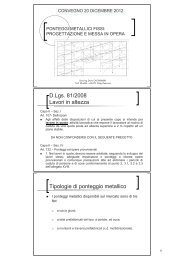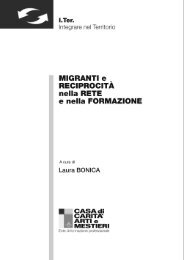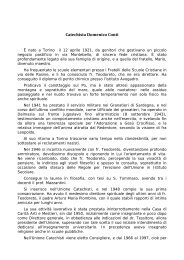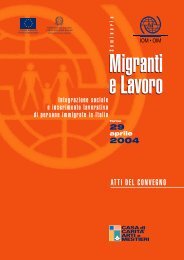Rapporto finale/ Final Report (ITA-ENG) - Casa di Carità Arti e Mestieri
Rapporto finale/ Final Report (ITA-ENG) - Casa di Carità Arti e Mestieri
Rapporto finale/ Final Report (ITA-ENG) - Casa di Carità Arti e Mestieri
Create successful ePaper yourself
Turn your PDF publications into a flip-book with our unique Google optimized e-Paper software.
THE RESEARCH TOOLS: INSTRUMENTS FOR FOSTERING<br />
DIALOGUE<br />
67<br />
As pointed out in Working Paper 2 (WP2), a wide range of tools were used for Dialogue Space activities.<br />
Some worked very well, while others were less effective in addressing the issues covered by the project<br />
and engaging learners. In this paragraph we <strong>di</strong>scuss the good practices which may be useful for<br />
future activities on this topic in schools.<br />
In all of the contexts involved, extensive use was made of group conversations, which were seen as a positive<br />
means for conducting an initial exploration; they were often aimed at encouraging the pupils to talk<br />
about themselves and their experiences.<br />
Meetings with experts and testimonials were equally popular and effective: these ranged from journalists<br />
and psychologists invited to the schools in Turin, a journalist who gave a talk to pupils in Spain, meetings<br />
with anthropologists and economists in France and various meetings with educators and social workers.<br />
Rather than formal conferences, most of these meetings were opportunities for an open and free <strong>di</strong>alogue<br />
between adults and pupils, aimed at pinpointing crucial aspects in the field of <strong>di</strong>scrimination.<br />
However, these tools were not equally effective across all contexts: in Germany, for example, the partner<br />
provided negative feedback on the open group <strong>di</strong>scussions but found the highly structured, moderatorled<br />
ones far more fruitful. In this particular context, students stated their own points of view, which were<br />
then remarked upon and <strong>di</strong>scussed by the others, under the guidance of a moderator.<br />
Most of the partners also used multime<strong>di</strong>a material such as films, videos and websites to draw pupils’<br />
attention to the topics covered by the project (in Spain, for example, much use was made of YouTube<br />
videos). These tools made it possible to approach, <strong>di</strong>scuss and reflect on these issues.<br />
In ad<strong>di</strong>tion to these tools, used by all of the partners, some also followed more country-specific paths<br />
or focused on certain tools in particular.<br />
In Italy, for example, Il Nostro Pianeta made substantial use of drama workshops. The ASI coor<strong>di</strong>nators<br />
and pupils involved viewed these as an effective means for allowing people to analyse their own<br />
approach to the issue in greater depth, verbal and non-verbal attitudes towards others and how they<br />
consider and react to <strong>di</strong>scrimination.<br />
Drama and improvisation was also an important channel in France, particularly because it was seen<br />
as a means through which the pupils could express themselves freely, without any filter. Besides improvisation,<br />
much attention was also given to the study and presentation of a number of works from<br />
“La plus grande pièce du monde” 12 . Some activities in France involved the use of stories told orally by<br />
African artists (“griots”), with the pupils working on tra<strong>di</strong>tional stories addressing the issues of acceptance<br />
and co-existence.<br />
The partners that used drama found this to be a powerful and very effective method, that could also<br />
be used in other contexts for its capacity to bring hidden aspects to light and foster the active involvement<br />
of young people.<br />
Role play was also used in many contexts, especially in Germany and Spain and by the Italian partner<br />
Il Nostro Pianeta. This tool was generally considered to be an effective means of breaking the ice<br />
and launching group activities, especially when the members <strong>di</strong>d not know each other very well.<br />
12 A collection of scripts by 153 authors on the subject of extremism, published following the success<br />
of Jean-Marie Le Pen, leader of the extreme right-wing National Front Party, in the 2002 French presidential<br />
elections.







